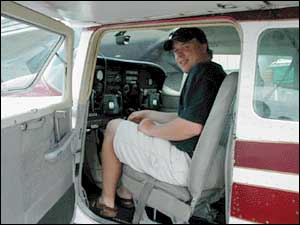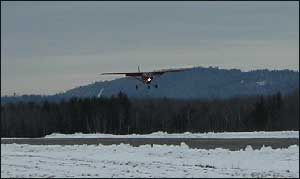(June 8):
Many people have a dream about learning to fly. Only some carry out that dream. Some do not have the money to pay for flight training, or don't have the hours to dedicate to their training (both book & practical), or think it's too dangerous.
To those people who intend to fulfill your dream, I commend you. IN this column, I have tried to hit on some points that I found helpful during my flight training.
 |
| The writer. |
Try it out:
Before you decide that you are going to get your private pilot's certificate (the license that most start off with), you have to be sure that you are willing to take on the commitment and that you are sure you want to fly.
Most flight schools have what they term an introductory flight, where you will go up with a CFI (an instructor) and will get to fly a little bit. That helps many novices decide whether or not flying is really for them. The instructor can also answer questions and give a good idea about how flight school works. Introductory flights are usually an inexpensive way to make a big decision.
Factors for your decision
Time -- This is a major consideration when making your decision. The Federal Aviation Administration currently mandates 40 hours to gain your private certificate (a little less for a recreational certificate), but most students average around 60. That also doesn't factor in the time needed to study (reading the books), write flight plans, and briefing, de-briefing, etc.
You need the time to complete this. As with learning anything, if you can't put a lot of time into it, either don't do it, or wait until you have the time. Flying once a month during training (and when you have your cert.) isn't a good idea, especially for training... with so much time in between lessons you lose a lot and will most likely have to go back over it.
Money -- It always comes to money, doesn't it? I will be frank and say flight training is not cheap. Talk to any pilot and they'll tell you the same thing. You have many costs to figure in, and it does all add up: Aircraft rental, instructor time, training products (books, flight computers, etc...), and the charts and FAA publications you need -- to name a few.
Starting off
Choose your school -- Choosing a flight school is one of the most important decisions to make. You have to feel comfortable with the school and its instructors, especially the instructor who will be teaching you. You can decide on whether you want to go to college to pursue your aviation dreams or get your license while doing other things. Shop around. There are different types of schools (Part 91 or 141) and they all have a different slant on things. There are also flying clubs that provide flight instruction.
Check to see if your school has a FAA-designated Pilot Examiner on staff. This makes it a lot easier when it comes time for you to complete your check ride.
Make sure that the instructors are invested in flying and aren't going to be 'blah' about it. The worst kind of instructor is an instructor who doesn't have a good attitude. This will transfer to the student or the student will get extremely frustrated and just give up.
Unfortunately, some instructors are only instructing to build up their hours so they can go on to the airlines. Flying for the airlines require numerous hours and some people instruct so that they can get paid and build the hours at the same time. Some instructors with this goal don't want to be instructing, and that attitude can carry over to the student.
Get your Medical Certificate Early -- This is also your student pilot's certificate (when endorsed by your instructor) and it will tell you if you meet the FAA's medical requirements to fly an aircraft. You need only have a third class medical certificate to hold a private pilot's certificate. It also takes some time to get in and get an appointment with an FAA Medical Examiner... your regular doctor is probably not certified by the FAA to issue medicals and most people have to have a different doctor as their medical examiner. Doing this early on in your training can save you money if for some reason you are medically unfit to fly.
Get a good training kit -- Remember those books I mentioned? There are a few companies offering different products (usually in the form of kits) for student pilots and usually come with the basic stuff that you will need (books, flight computer, logbook, fuel tester, and a plotter). The two companies most frequently used are Jeppesen and Gleim.
Getting Resources
Talk with pilots -- The best people to talk to are people who went through flight training and have their certificates. They can tell you about the process and how it works. Pilots are a wealth of information for a student.
When they see you have a genuine interest in flying, they're usually more than helpful and may even take you under their wing and help you out. They usually know about the flight schools around their area and can give you some inside info.
If you have an airport around where you live, stop by and visit the Fixed Base Operator (FBO). These folks are also a wealth of information and is the usual pilot hangout. Flying clubs are also a great resource.
 |
| On final approach. (Images courtesy of Ryan Connon) |
Do your research -- There are many sites on the Internet dedicated to learning to fly take some time (there's that 'time' word again) and thoroughly research things. The FAA's website (www.faa.gov) also has information online, sample written test questions, practical standards, and you can search for Flight Schools and Medical Examiners on line.
Organizations -- There are different organizations dedicated to the pilot and student pilot. Probably the most prominent is the Aircraft Owners & Pilots Association (www.aopa.org).
Become a member (it's around $40/year) and you get their magazine and access to their "Members Only Website" which has a wealth of information. Being a member also allows you to call up their offices, manned by pilots (mostly instructors) who can answer your questions about flight training, regulations, etc... They will also help you with dealing with the FAA, which you have to realize, is a government office. AOPA has dedicated student-training sections that will prove invaluable.
Last of all, keep a good attitude, don't let things get you down and roll with the punches. Sometimes the weather doesn't cooperate or things come up. If you are invested in your flight training, then things will work out.